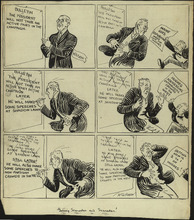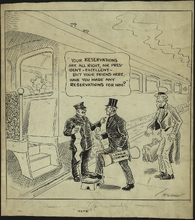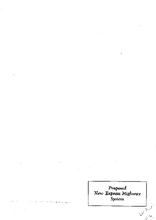JM-170: Getting scareder and scareder!
Model
Image
Description
This cartoon depicts President Woodrow Wilson planning his reelection campaign against Charles Evans Hughes during the presidential election of 1916. The first panel shows President Wilson calmly planning to take a passive role in the campaign until he receives a note that the state of Maine voted for Hughes by a narrow majority. The second panel shows a concerned Wilson receiving news that Hughes was addressing crowds in the West, whose vote Wilson was counting on for winning the election. The third panel shows a shocked Wilson learning Hughes was predicted to win the election by a large margin. Despite the assumptions made in this cartoon, Woodrow Wilson would defeat Hughes in the election of 1916, and he became the first democratic president to serve two consecutive terms in a row since Andrew Jackson. Woodrow Wilson appealed to many with his campaign slogan, "He kept us out of war," which appealed to many European (especially German) immigrants who did not wish to have the conflict of loyalty that would come from the United States joining World War I. Despite this, the United States would eventually enter World War I in 1917 during Wilson's second term. The Chicago Tribune published many articles in support of Hughes and his campaign. (Summary created by Mary Delano, MU History Intern, Spring 2018)
Service File - Download


